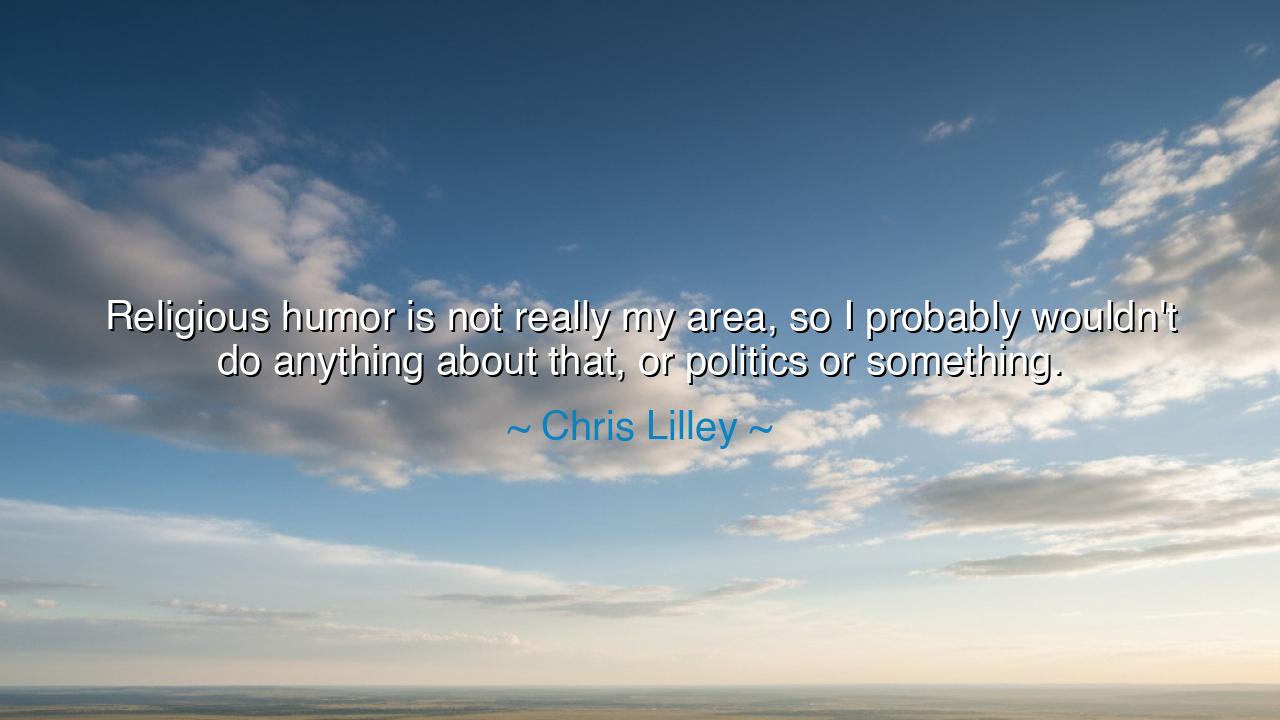
Religious humor is not really my area, so I probably wouldn't do
Religious humor is not really my area, so I probably wouldn't do anything about that, or politics or something.






When Chris Lilley said, “Religious humor is not really my area, so I probably wouldn’t do anything about that, or politics or something,” he was not merely setting limits on his art — he was speaking to a deeper truth about wisdom, respect, and self-awareness. In these simple words lies a profound lesson: that the artist, the thinker, and the human being must know the boundaries of their own understanding, and tread with humility where sacred or volatile subjects dwell. Lilley, a craftsman of humor and character, recognized that not all laughter is born of wisdom, and that the art of knowing what not to say can be just as noble as knowing what to say. His words remind us that silence, when guided by understanding, is not weakness — it is strength.
The meaning of this quote rests upon the ancient virtue of discernment — the ability to distinguish between what may enlighten and what may offend without purpose. Religious humor, political satire, and commentary on sacred beliefs are powerful tools, yet they are double-edged. Used without insight or empathy, they can divide hearts rather than awaken minds. Lilley’s choice to avoid these realms is not an act of fear, but of reverence. He acknowledges that these are domains charged with history, faith, and identity — places where humor must bow before understanding. He reminds us that comedy, like speech itself, carries responsibility: it has the power to lift or to wound, to unify or to scatter.
The ancients often warned of this same truth. The philosopher Socrates, known for questioning all things, was careful not to mock the gods of Athens. His inquiries were born of reverence for truth, not disdain for faith. Yet even so, his pursuit of wisdom led him to his death — for the world is quick to mistake questioning for offense. Socrates’ fate illustrates what Lilley knows intuitively: that religion and politics are not mere topics, but territories of the soul and the state. To jest in such realms requires not only wit, but a depth of empathy and courage few possess. And to abstain, when one’s voice might only bring division, is not cowardice but wisdom.
Consider too the tale of the playwright Aristophanes, who used humor to expose the follies of Athens. His satire was biting, yet even he understood the delicate balance between laughter and reverence. When he mocked philosophers or politicians, it was to correct their errors, not to humiliate them. His plays carried the spirit of civic duty — laughter that built, not laughter that burned. In Lilley’s restraint, we see the same moral awareness. He chooses not to tread the path of mockery for its own sake, but to focus on the universality of human behavior — the comedy found in our shared flaws, not in the sacred beliefs that divide us.
There is also a quiet humility in Lilley’s confession. By saying, “It’s not really my area,” he accepts that every artist has their realm of truth, their domain of insight. In a world that glorifies opinion and noise, this humility is rare. To admit, “I do not know enough,” is an act of courage. It is the same humility the ancient sages practiced — those who spoke only after long silence, who pondered deeply before uttering a single word. Lilley’s restraint reflects a timeless principle: the wise do not speak merely because they can; they speak because they must, and only when their words will bring light.
The lesson we can take from this is simple yet profound: not every stage is ours to stand upon. The world is full of sacred fires — faith, culture, belief — and to approach them without understanding is to risk being burned. If your words do not heal or enlighten, let them rest. Yet if your heart is drawn to these realms, first seek to understand them deeply. Learn, listen, and feel before you jest. For humor, when wielded without wisdom, becomes cruelty; but when tempered with empathy, it becomes revelation.
So, my listener, let these words be your guide: Know your voice. Know your boundaries. Know your purpose. Speak from knowledge, not arrogance; from respect, not rebellion. In a world where many speak to provoke, be among those who speak to connect. There is courage in restraint, honor in humility, and power in discernment. The artist who knows what not to touch preserves the sanctity of both art and soul.
For in the end, Chris Lilley’s words are not about avoiding offense — they are about embracing integrity. He reminds us that the truest humor, the truest expression, does not come from mocking what others hold sacred, but from revealing what makes us all human. To know where one’s voice belongs is to walk the path of wisdom. And to use that voice not to divide, but to illuminate — that, my friends, is the calling of every creator, every thinker, and every soul who dares to speak.






AAdministratorAdministrator
Welcome, honored guests. Please leave a comment, we will respond soon